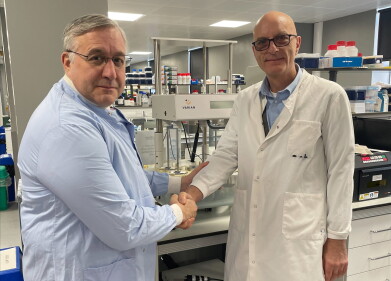News
UK starts Production on Core Components for DUNE Project
Mar 13 2021
A team of engineers and technicians at the STFC’s Daresbury Laboratory and its university partners in the North-West have started production on vital detector components for the Deep Underground Neutrino Experiment (DUNE) hosted by Fermilab in the US. The UK government has invested £65 million into this major international science experiment which will study elusive neutrinos in a bid to advance our understanding of the origin and structure of the Universe.
Scientists will capture the neutrinos in detectors containing 17,000 tons of liquid argon, with the tiny electrical signals of neutrino interactions read out by Anode Plane Assemblies (APA). APAs are huge rectangular planes covered with thousands of copper-beryllium wires, about the width of a human hair. Each APA stands at an impressive 2.3m by 6.3m – making them the largest individual components for DUNE, and they have to be built with millimetre precision.
Daresbury Laboratory – located at Sci-Tech Daresbury in the Liverpool City region, will ultimately produce 150 APAs for the project. To meet this need, a large purpose-built APA factory was created at Daresbury inside a former accelerator hall and 20 specific jobs were created for this task.
The high-precision APAs will first undergo cryogenic testing in the ProtoDUNE-II detector at the European Organization for Nuclear Research (CERN), before the full set of APAs for DUNE are built. The process will take several years to complete.
Executive Chair of STFC Professor Mark Thomson, said: “It is impressive that the project team continues to make excellent progress in such a challenging year. This development means that 2021 should be the year of the Final Design Review and beginning of ‘mass’ production of APAs at Daresbury – a huge milestone for everyone involved and a major step towards the construction of this incredibly exciting neutrino experiment. I am deeply proud of the team at Daresbury for how hard they have continued to work in difficult circumstances."
Physicists from the universities of Liverpool and Manchester provide the scientific leadership of the project. DUNE spokesperson Professor Stefan Soldner-Rembold, of the University of Manchester said: “These detector components will play a key role in unravelling the mystery of neutrinos and their role in the formation of the Universe.”
The excavations of the underground facilities in South Dakota have recently started and Professor Soldner-Rembold added: “The international team of neutrino physicists working on DUNE is excited to welcome the first of the large detector components built by the UK – the biggest non-US contributor to this global experiment.”
Digital Edition
ILM 50.2 March 2025
March 2025
Chromatography Articles - Effects of small deviations in flow rate on GPC/SEC results Mass Spectrometry & Spectroscopy Articles - Waiting for the present to catch up to the future: A bette...
View all digital editions
Events
Mar 31 2025 Beijing, China
Microbiology Society Annual Conference 2025
Mar 31 2025 Liverpool, UK
Apr 01 2025 New York, USA
Apr 02 2025 Saigon, Vietnam
Apr 09 2025 Tokyo, Japan























